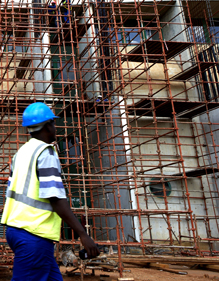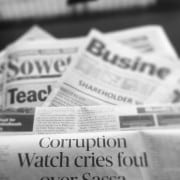|
Getting your Trinity Audio player ready...
|
 By Nicola Whittaker
By Nicola Whittaker
The total settlement with 15 companies is in excess of R1.4bn. Aveng, Murray & Roberts, Stefanutti Stocks and WHBO are all individually coughing up in excess of R300m to pay for their sins. Or the sins of their past — and now happily retired — employees, if we are to believe statements made by company executives in the Competition Tribunal earlier this week.
Further figures are also being bandied about as to the amounts received by some companies, and paid by others, as “loser’s fees” — piqued the tribunal’s interest, including their interest in how such “fees” were recorded in the companies’ books.
But the construction cartel is not all about money. At the heart of this saga is the question of trust.
Of late, the public has become more vocal in questioning the integrity of private institutions which, just like the state, are powerful and important players in the provision of goods and services.
Integrity — or the lack thereof — was brought into focus by the financial crisis and questions abounded as to whether the public could still trust the custodians of their savings.
This lack of trust has, on occasion and often with good reason, extended to the pharmaceutical industry, the food industry and the media.
You name it: in most important economic sectors, trust in the private sector is at an all-time low.
The level of public outrage is palpable, and demand for retribution is growing.
This week, Corruption Watch appeared before the Competition Tribunal and urged it to confirm the settlement agreement between the Competition Commission and the construction companies.
This agreement incorporated the fine but also admissions of guilt — which open the door for civil damages claims.
We pointed out that the settlement had saved massive investigation and prosecution costs. However, we also identify with those who complain that the retribution is insufficiently punitive and not a deterrent.
We suggested a number of ways in which the effective penalties could be increased. We called for swift action by the Competition Commission against companies in the cartel who have not settled claims. We urged that future consent agreements include provisions for “naming and shaming” perpetrators.
We called on companies to claw back bonuses awarded to those implicated in the cartel. We called for criminal charges to be laid against individuals who have contravened the Prevention and Combating of Corrupt Activities Act. We called on government entities and private companies to institute damages claims to recover losses and for shareholders to hold company directors to account.
But retribution alone will not restore the public’s trust in business. Advocate David Unterhalter, SC, for the Competition Commission told the tribunal that the corporate leniency process initiated by the commission aimed to, among other things “clean up the construction industry”.
Companies who submitted to this process must, in addition to writing cheques to the National Revenue Fund, cooperate with the commission and other authorities as well as incorporate competition law compliance programmes in their businesses.
But ticking all the compliance boxes will only take companies so far. What is really required is the restoration of the public’s trust.
And trust lost, as we all know, is not easy to win back.
Perhaps business and the government can follow the lead set last week by Finance Minister Pravin Gordhan, and publicly demonstrate their intolerance for unethical conduct, which brings important institutions into disrepute.
And maybe it is time too for business and the government to see the value in associating themselves with the public and their interests and, in particular, with organisations like Corruption Watch, which aim to expose corruption, including anti-competitive collusion.
Business and the government should seek to expose corruption, identify and implement policy reforms aimed at decreasing vulnerability to corruption in public resource management systems.
The cost of corruption is usually measured in money. But the erosion that corruption causes to the public’s trust of important public and private institutions is at least as great, possibly greater. If the public cannot trust the police, or teachers or healthcare providers, not to mention leaders of the public service and political parties, democracy is threatened.
By the same token, the public needs to trust those who look after its savings, who produce its food, who provide its medicines and those who build its roads. This is the basis of the implicit social contract that holds societies together.
When the dust has settled in the construction cartel scandal, attention must turn to restoring trust. That may be an altogether more difficult task.
Whittaker is head of legal and investigations at Corruption Watch.
• This article was first published in Sunday Times' Business Times
The total settlement with 15 companies is in excess of R1.4bn. Aveng, Murray & Roberts, Stefanutti Stocks and WHBO are all individually coughing up in excess of R300m to pay for their sins. Or the sins of their past — and now happily retired — employees, if we are to believe statements made by company executives in the Competition Tribunal earlier this week, writes Corruption Watch's Nicola Whittaker.







